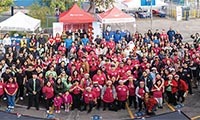These prophetic words came from a 2005 presentation by David Eyton, who was then vice president for BP’s deepwater developments in the Gulf of Mexico. Reprinted that year in a journal of the Society of Exploration Geophysicists, the speech acknowledged that oil companies “did somewhat underestimate the full nature of the challenges we were taking on in the deep waters of the gulf.”
Still, Mr. Eyton expressed buoyant optimism that BP’s risk management expertise, as well as its new technologies, would play a “critical role” in allowing the company to triumph over nature’s daunting obstacles.
As the world now knows, it did not turn out that way.
As BP struggled to stanch the flow of spewing oil at the Deepwater Horizon rig, it has become clear that the pressure to dig deeper and faster from what Mr. Eyton then called a “frontier province” of oil exploration has in some ways outpaced the knowledge about how to do that safely.
Americans have long had an unswerving belief that technology will save them . And yet, as Americans watched scientists struggle to plug the undersea well over the past month, it became apparent that their great belief in technology was perhaps misplaced.
“Americans have a lot of faith that over the long run technology will solve everything, a sense that somehow we’re going to find a way to fix it,” said Andrew Kohut, president of the Pew Research Center for the People and the Press. He said Pew polling in 1999 found that 64 percent of Americans pessimistically believed that a terrorist attack on the
United States probably or definitely would happen. But they were naively optimistic about the fruits of technology: 81 percent said there would be a cure for cancer, 76 percent said Americans would put men on Mars.
American’s experience of technology has been largely wondrous and positive: The green revolution ameliorated the problem of world hunger (for a time at least) with better seeds and fertilizers to increase harvests. When childhood diseases were ravaging the world, vaccines came along and (nearly) eliminated them. There are medicines for the human immunodeficiency virus and AIDS. There is the iPad.
Many experts in the field of undersea oil exploration believe that technology can also resolve the risks of operating several hundred meters under the seabed, despite BP’s current problems.
“We’re pushing the envelope, but I personally believe that the technology, in terms of equipment and processes, will be able to keep up with what we’re doing ? though this experience may slow things down,” said Stefan Mrozewski, a senior staff associate at the Lamont-Doherty Earth Observatory of Columbia University, whose research involves projects like drilling boreholes in deep water to study chemicals under the seafloor.
William Jackson, deputy director general of the International Union for Conservation of Nature in Gland, Switzerland, said abstract devotion was misguided: “At this time in history we have great faith in having the technological ability to solve problems, and that faith has proved incorrect in this place.”
He pointed out that pledges by the coal industry and some countries to curb future carbon dioxide emissions often assume the successful evolution of technologies that are as yet unproven or have never been tried on a large scale.
“There is this belief that an engineering solution can be found as you move along,” he said .
In the beginning of May, a few weeks after the rig explosion, the Pew Research Center asked 994 Americans about the oil spill: 55 percent saw it as a major environmental disaster, and 37 percent as a serious problem. But at that time, at least, 51 percent also believed that efforts to prevent the spill from spreading would be successful. Hundreds of thousands of barrels of oil later, federal officials released a new estimate of the spill - 12,000 to 19,000 barrels a day - establishing it as the largest in American history. As Richard Feynman, the physicist, once observed, “For a successful technology, reality must take precedence over public relations, for nature cannot be fooled.” Sometimes ingenuity may not help us.
Indeed, think of all the planes grounded for nearly a week in northern Europe in April, as a volcano poured ash in the atmosphere. There was no technological fix, and many passengers couldn’t believe it. Said Mr. Kohut , “The reaction was: ‘Fix this. Fix this. This is outrageous.’ ”
By ELISABETH ROSENTHAL
A robotic arm trying to stop the flow of oil from the Deepwater Horizon rig.
A deep seas drill in the Gulf of Mexico in 2006.
스마터리빙
more [ 건강]
[ 건강]이제 혈관 건강도 챙기자!
[현대해운]우리 눈에 보이지 않기 때문에 혈관 건강을 챙기는 것은 결코 쉽지 않은데요. 여러분은 혈관 건강을 유지하기 위해 어떤 노력을 하시나요?
 [ 건강]
[ 건강]내 몸이 건강해지는 과일궁합
 [ 라이프]
[ 라이프]벌레야 물럿거라! 천연 해충제 만들기
 [ 건강]
[ 건강]혈압 낮추는데 좋은 식품
[현대해운]혈관 건강은 주로 노화가 진행되면서 지켜야 할 문제라고 인식되어 왔습니다. 최근 생활 패턴과 식생활의 변화로 혈관의 노화 진행이 빨라지고
사람·사람들
more
[송년행사 화보] “이웃과 함께 나누고 지인과 함께하니 행복”
KYCC13일 윌튼 플레이스 초등학교에서 열린 ‘한인타운청소년회관(KYCC) 홀리데이 카니발’이 성황리에 막을 내렸다. 올해는 KYCC 창립 …

[송년행사 화보] “ ‘손에 손잡고’ 한 해 마무리… 건강과 행복 기원”
전주고·북중남가주 전주고·북중 총동창회(회장 백규종)의 2025년 정기총회 및 송년회가 지난 14일 LA 작가의 집에서 성황리에 열렸다. 이날…
[송년행사 화보] “한 해를 마무리하며… 화기애애…
LA 러너스클럽LA 러너스클럽(회장 김두병)은 13일 작가의 집에서 80여명의 회원과 가족이 참석한 가운데 송년회를 마쳤다. 2007년 창립된…
[송년행사 화보] “웃음과 감사 가득 ‘훈훈’… …
한국학교총연합회미주한국학교총연합회(회장 이영숙)가 주최한 제43회 장기 근속교사 포상 및 송년의 밤 행사가 140여명의 교사들이 참석한 가운데…
[송년행사 화보] “친구야 반갑다… 선배님들 모두…
경남중고경남중·고등학교 남가주 동창회(회장 예해덕)는 지난 6일 송년회를 열고 동문 및 가족 60여 명이 참석한 가운데 끈끈한 우정을 확인했다…
많이 본 기사
- LA산불 여파 ‘심각’ 지역 주민 건강악화
- 크리스마스 연휴 겨울폭풍 남가주 연안 2~4인치 비
- 브라운대 한인학생, 총격참사 극적 생존
- 미 북서부는 홍수, 동부는 폭설 사태 비상
- LA 소파이 스테디엄 8경기 확정
- 일본도 핵잠 도입 논의 본격화? 방위장관 미 해군기지 핵잠 시찰
- 치솟는 원·달러 환율… 1,480원대 찍어
- 중고차 주행거리 조작 ‘주의보’
- ‘우크라 전쟁 피해배상’ 국제기구 만든다
- 트럼프, 베네수엘라 정권 ‘테러 단체’ 지정
- ‘브라운대 총기참사’ 뉴욕 한인학생도 총상
- [윌셔에서] 잠시 멈추어 서서
- 시드니 총기난사범, 인도 출신 이민자
- 박나래 빠진 ‘나혼산’ 촬영 현장 어땠나.. “웃음 보장 100% 조합”
- 뉴욕주 안락사 합법화 초읽기 호쿨, “안전장치 마련되면 서명”
- 에어 프레미아 취항, 기대 컸나
- ‘돈봉투 수수’ 민주당 전현직 의원들 2심 무죄…1심 뒤집혀
- ‘천의 얼굴’ 루푸스… “젊은 여성, 이유 없는 발진·탈모 있으면 의심해야”
- 트럼프 “내년봄 최대규모 세금환급…군… 2
- ‘항염증 식단’ 정답은 균형… 전체적 패턴이 중요
- VA 한인 2세, 드라마 주연 맡아
- 월드컵 방문객 ‘미국행’… 한국선 ESTA(전자 여행 허가서)로 입국 가능
- “AI 활용 한국어 수업, 선택 아닌 필수”
- 비트코인, 역대 네번째 연간 하락세
- 내년에 집 팔려면, 어떤 준비가 필요할까?
- 강경화 주미대사 신임장 제정 트럼프, 이 대통령 안부 물어
- “판공비 1만달러 전액 반환하겠다”
- 백악관 역대 대통령 사진에 악플 단 … 2
- 뉴욕한인 팔레스타인 활동가 체포
- 팰팍 최대규모 주상복합단지 들어서나 1
- “야, 매운맛 좀 보자”..차승원·추성훈, ‘15년 우정’의 ‘차가네’
- 뱅크오브호프, 규모도 1위·봉사활동도 ‘으뜸’
- “신뢰감 있는 이미지”..김도훈, 광고계 러브콜 쇄도
- [수잔 최 변호사의 LIFE &] AI 시대 편리함에 안주하지 말자
- 박찬욱 ‘어쩔수가없다’, 아카데미 예비후보
- [여명] 금붕어를 키우는 오지선다형 수능
- VA·MD 등 21개주, 우버 상대 소송 제기
- [로터리] 지멘스가 만드는 미래 동네
- 5년 규칙은 옛말… 집 사고 10년은 보유해야 본전
- 테슬라, 자율주행 과장광고 적발
- “동지 팥죽도 드시고 달력도 받아가세요”
- 유급 가족병가, 15명 이상 사업체로 확대
- 워런 버핏의 투자자 위한 핵심 조언은
- 올림퍼스스파 2만달러…불우이웃돕기성금 쇄도...현재까지 3만달러 넘어…장철호ㆍ서울대ㆍ시산회ㆍ최병택씨 기탁
- 상습적 아동 성추행 치어리딩 코치 유죄
- 김유정, 이번엔 귀신이다.. ‘복수귀’서 박지환→조여정과 호흡
- 자폐 어린이 돕기 ‘신년 나눔 음악회’
- “트럼프 경제 지지도 36%…집권 1·2기 통틀어 최저치”
- 한인상공회의소 ‘A 성적표’ 받았다...힘들게 출발했지만 그랜트 등 적지 않은 노력과 결실로 2년 임기 마쳐
- “사고 직후 대응이 보상 좌우한다”
1/5지식톡

-
 ☝️해외에서도 가능한 한국어 선생님…
0
☝️해외에서도 가능한 한국어 선생님…
0이 영상 하나면 충분합니다!♥️상담신청문의♥️☝️ 문의 폭주로 '선착순 상담'만 진행합니다.☎️ : 02-6213-9094✨카카오톡ID : @GOODEDU77 (@골뱅이 꼭 붙여주셔야합니다…
-
 테슬라 자동차 시트커버 장착
0
테슬라 자동차 시트커버 장착
0테슬라 시트커버, 사놓고 아직 못 씌우셨죠?장착이 생각보다 쉽지 않습니다.20년 경력 전문가에게 맡기세요 — 깔끔하고 딱 맞게 장착해드립니다!장착비용:앞좌석: $40뒷좌석: $60앞·뒷좌석 …
-
 식당용 부탄가스
0
식당용 부탄가스
0식당용 부탄가스 홀세일 합니다 로스앤젤레스 다운타운 픽업 가능 안녕 하세요?강아지 & 고양이 모든 애완동물 / 반려동물 식품 & 모든 애완동물/반려동물 관련 제품들 전문적으로 홀세일/취급하는 회사 입니다 100% …
-
 ACSL 국제 컴퓨터 과학 대회, …
0
ACSL 국제 컴퓨터 과학 대회, …
0웹사이트 : www.eduspot.co.kr 카카오톡 상담하기 : https://pf.kakao.com/_BEQWxb블로그 : https://blog.naver.com/eduspotmain안녕하세요, 에듀스팟입니다…
-
 바디프렌드 안마의자 창고 리퍼브 세…
0
바디프렌드 안마의자 창고 리퍼브 세…
0거의 새제품급 리퍼브 안마의자 대방출 한다고 합니다!8월 23일(토)…24일(일) 단 이틀!특가 판매가Famille: $500 ~ $1,000Falcon: $1,500 ~ $2,500픽업 & 배송직접 픽업 가능LA…
케이타운 1번가
오피니언
 수잔 최 한미가정상담소 이사장 가정법 전문 변호사
수잔 최 한미가정상담소 이사장 가정법 전문 변호사 [수잔 최 변호사의 LIFE &] AI 시대 편리함에 안주하지 말자
 김도년 성균관대 건축학과 교수 스마트도시·건축학회장
김도년 성균관대 건축학과 교수 스마트도시·건축학회장 [로터리] 지멘스가 만드는 미래 동네

[여명] 금붕어를 키우는 오지선다형 수능
 허경옥 수필가
허경옥 수필가 [윌셔에서] 잠시 멈추어 서서
 양홍주 / 한국일보 논설위원
양홍주 / 한국일보 논설위원[지평선] 판다 없는 일본

[왈가 왈부] 쿠팡 김범석 “글로벌 CEO라 불출석”… ‘맹탕’ 청문회 불보듯
 정숙희 논설위원
정숙희 논설위원칠레에서 영국까지, 27년을 걷다
 마크 A. 시쎈 / 워싱턴포스트 칼럼니스트
마크 A. 시쎈 / 워싱턴포스트 칼럼니스트 [마크 A. 시쎈 칼럼] MAGA와 ‘힘에 바탕한 외교정책’
 김동찬 시민참여센터 대표
김동찬 시민참여센터 대표 [미국은 지금] 위기의 시대, 사회안전망은 최후의 방어선이다
1/3지사별 뉴스

‘브라운대 총기참사’ 뉴욕 한인학생도 총상
▶총상 입은 상황서도 동료학생 의식 잃지않도록 도와 ▶부친도 동문 “우리 가족에게 고통스러운 일”지난 13일 발생한 브라운대학교 총기난사(본보…
뉴욕주 안락사 합법화 초읽기 호쿨, “안전장치 마련되면 서명”

에어 프레미아 취항, 기대 컸나
에어 프레미아의 워싱턴 덜레스 국제공항과 인천국제공항간 취항이 확정된 가운데(본보 15일자 A1면), 에어 프레미아 항공권 가격이 당초 기대에…
VA·MD 등 21개주, 우버 상대 소송 제기

베이지역 스포츠팀, SF 한인회에 후원금
샌프란시스코 베이지역 한인회(회장 김한일)는 한인 메이저리거 이정후 선수의 소속팀인 샌프란시스코 자이언츠(San Francisco Giants…
불자커뮤니티 20일 청소년발표회및 송년회

오늘 하루 이 창 열지 않음 닫기 





















































.png)


댓글 안에 당신의 성숙함도 담아 주세요.
'오늘의 한마디'는 기사에 대하여 자신의 생각을 말하고 남의 생각을 들으며 서로 다양한 의견을 나누는 공간입니다. 그러나 간혹 불건전한 내용을 올리시는 분들이 계셔서 건전한 인터넷문화 정착을 위해 아래와 같은 운영원칙을 적용합니다.
자체 모니터링을 통해 아래에 해당하는 내용이 포함된 댓글이 발견되면 예고없이 삭제 조치를 하겠습니다.
불건전한 댓글을 올리거나, 이름에 비속어 및 상대방의 불쾌감을 주는 단어를 사용, 유명인 또는 특정 일반인을 사칭하는 경우 이용에 대한 차단 제재를 받을 수 있습니다. 차단될 경우, 일주일간 댓글을 달수 없게 됩니다.
명예훼손, 개인정보 유출, 욕설 등 법률에 위반되는 댓글은 관계 법령에 의거 민형사상 처벌을 받을 수 있으니 이용에 주의를 부탁드립니다.
Close
x